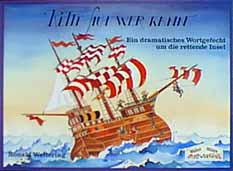Game Review - Rette Sich Wer Kann by Ronald Wettering
Rette Sich Wer Kann, Ronald Wettering, Walter Müllers Spielewerkstatt, 1993.
- Players: 3-6
- Duration: 60 minutes
- Ages: 12+ years
- Categories: board, family, negotiation
- Reviews:
O'Sullivan
Siggins
Sarrett
Rette Sich Wer Kann
is an excellent game of diplomacy,
manipulation, and social interaction.
Loosely translated as
Save Who You Can or Every Man for Himself
and affectionately known as The Lifeboat Game,
this game crams more arguments and alliances into an hour
than a weekful of Senate hearings.
In fact, those who love Avalon Hill's Diplomacy
or Reiner Knizia's Quo Vadis?
probably will enjoy this game.
Those who dislike conflict or backstabbing their gaming
friends likely will hate this game.
The game is the utmost of simplicity.
Each turn is goverened by four actions:
- Place a leak in one of the boats.
- Move a boat forward.
- Each player selects a passenger to jump out of a boat.
- Each player attempts to swim back in another boat.
Placing the leak and moving a boat forward are determined by voting.
Each player receives a colorful voting wheel to select a boat by
color and the votes are revealed simultaneously.
Additionally, if there are more leaks that seats in the boat,
players must vote for who must leave the boat and drown.
In this special vote, each player receives one vote per passenger
and two votes for each of the larger
"ship's crew" pawns.
The plurality vote decides who stays and who goes.
Ties are settled by the holder of the important Big Stick,
a wooden dowel passed from player to player in turn.
One important exception to the voting rule is
"The Captain's Hat," which
may be secretly selected during a vote, up to three times per game.
If one usurps the captain's position, one may override majority rule
and determine the outcome of the vote.
On the other hand, if more than one passenger selects
the Captain's Hat, the hat tokens are discarded and have no
effect.
The vote proceeds as normal as the two players fight
over who will be captain.
The goal of all the players is to reach the set of three islands at the top
of the game board.
Those landing on the island are awarded between 5 and 8 points
depending on whether they are a regular passenger or ship's crew.
At the end of the game all points are tallied and a victory is awarded.
This game has been a big hit with every group I've played.
Even first timers grab hold of the rules and are
striking deals and making pacts very quickly.
For some reason, I have often been on the short end of
various evil boating alliances and tossed into the drink.
Perhaps it is a case of students attacking and allying against
thier teacher.
Perhaps I have some hidden Captain Bligh tendencies
that evoke a mutiny.
Nevertheless, the games have always been fun
for player and spectators alike.
It is usually the loudest and most argumentative game going.
There are always loud screams as players reveal their votes
and one realizes they are at the short end of a double-cross.
The game components are first rate with large blocky wood ships
that float in the bathtub
and 6 players worth of wooden pawns.
Had this been some other manufacturer, I'm sure we would have
seen carboard ships and passenger counters.
The artwork is early Doris Matthaus watercolor and
can be seen in the pictures: cartoonish, humorous and chucklesome.
For those that like wheeling and dealing this is a great game,
and I recommend it highly.
It emphasizes talking and interaction and would certainly
lose much of its appeal if it were translated to a computer game.
The game is now 6 years old and is tough to find, but I don't think it has
lost any appeal.

Home|
Top|
Ale|
Flight|
Games|
Guitars|
Miniatures|
MTB|
Podcasts|
Poophead|
Trains|
Tri|
Other Hobbies|
Weather|
Feedback
Last modified: Sunday, 28-Apr-2019 14:18:10 MST.



